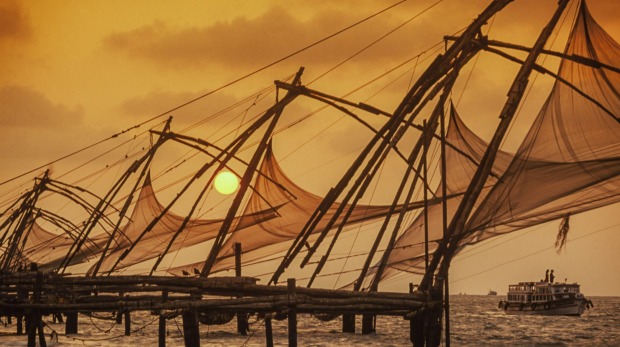
DO: SUGAR AND SPICE
Kochi is still a conduit for spices grown in the interior of Kerala, and Fort Cochin's Bazaar Road mixes the heady aromas of cinnamon, cardamom, ginger and cloves. The dealers here are wholesale traders for the most part. Ask for anything less than a sack of curry leaves and they won't budge, but sniffing is free.
SEE: DANCE DRAMA
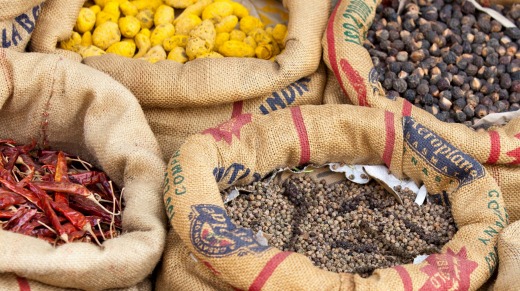
Fort Cochin is the best place to see a kathakali performance, the stylised, elaborately costumed dance-drama based on the Hindu epics. Be early – the highlight is the make-up session that precedes the dance. One of the best performances is the Kerala Kathakali Centre in K. B. Jacob Road, near Santa Cruz Cathedral.
DRINK: BRUNTON BOATYARD
Close to the Chinese Fishing Nets, Brunton Boatyard is a mostly white, boutique hotel that makes the most of its colonial origins and its waterfront location. Towards sundown, put on your finest linens and head for the hotel's Armory Bar, order a gin and tonic and watch the passing nautical parade, from container ships to fishing dhows.
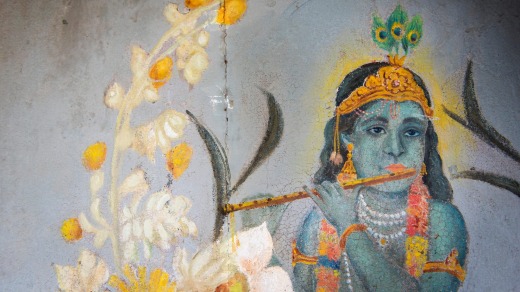
EAT: DAL ROTI
Run by the genial, white-bearded Ramesh, this is the best lunch place in Kochi, a casual, convivial and oh-so-cool restaurant with fantastic North Indian food. Try the roti wrap with peach iced tea, and do not miss the firni, made from almonds, apricots, saffron and milk, garnished with pistachios.
SEE: CHINESE FISHING NETS
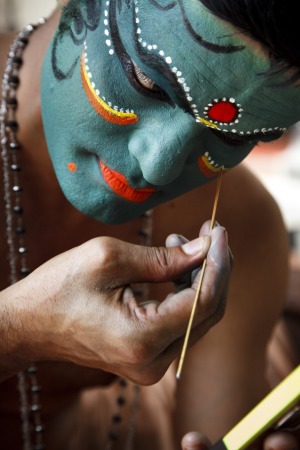
Located at the northern end of Fort Cochin, the Chinese fishing nets are the number one icon for Kerala tourism, especially when they're silhouetted against the setting sun. Introduced by Chinese merchants, the nets are suspended from a four-pronged framework, like a huge hammock. At high tide the nets are dipped into the water, left submerged for a couple of minutes and raised by men hauling on ropes. When there are fish in the net the fishermen race to beat the ever-present crows.
DO: AYURVEDIC MASSAGE
Kerala is the home of Ayurvedic treatments, and massages are a thriving mini-industry in the back streets of Fort Cochin. This is a long-stroke massage treatment and it uses so much oil that you'll be sliding around on the massage table like a slippery fish. Massage salons are fairly basic in comparison with their svelte counterparts in Bali and Thailand, but the experience is not to be missed. One of the best is the Cochin Ayurvedic Centre at the corner of Santa Cruz Road and Peter Celli Street.
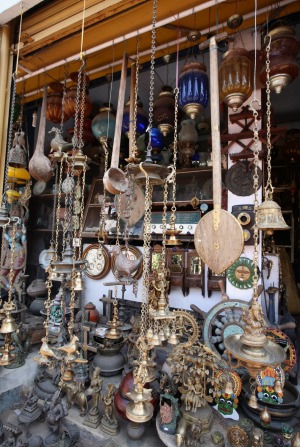
EAT: KASHI ART CAFE
Pass through the gallery at the front and you're in a cool courtyard cafe with tropical flourishes, a hip grazing ground for backpackers, well-to-do locals and happy wanderers on the path to enlightenment. Chocolate cake, omelettes, fruity frappes and coffee worth the name are some of the house specialties on the mainly Western menu, with a few spicy moments.
SEE: MATTANCHERRY PALACE
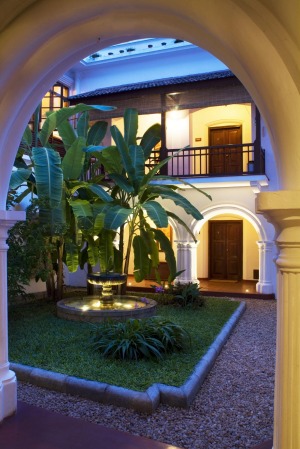
Built by the Portuguese in the 16th-century as a bribe to secure trading rights, the former palace of the Raja of Cochin houses a collection of elaborate coronation robes, disintegrating palanquins and royal family portraits, but the big drawcard is the wall murals that depict various episodes from the sacred texts of Hinduism. Note the mural in the women's bedchamber showing Krishna, the playboy of the Hindu pantheon, playing the flute surrounded by bosomy milkmaids.
SHOP: ANTIQUES
Fort Cochin is an antique treasure trove, especially if your tastes run to painted wardrobes and chests, Chinese ceramics big and eye-popping wooden statues from Syrian Christian churches – one of the dominant faiths in Kerala. Centre of the trade is Synagogue Lane, in Jew Town, but prices are high so bargain hard. Look for the shop that sells exquisite lacework.
SEE: PARDESI SYNAGOGUE
The Malabar Coast has hosted a Jewish community for at least 2000 years and Jew Town, a subsection of Mattancherry, has a different flavour from the rest of the city. Only a handful of this once thriving community remain, the rest have left for Israel. The most striking reminder of their presence is the Pardesi Synagogue, built in 1568. Take a look inside at the hand-painted Cantonese floor tiles.
DO: BACKWATER CRUISE
Stretching south from Kochi, the backwaters is a network of creeks, lagoons, lakes and rivers laced together by canals. This is village India at its scenic best, a watery tapestry of rice fields separated by swooning avenues of coconut palms, and a journey through the backwaters is one of the highlights of the Indian experience. Travel agents in Kochi can put you aboard a converted rice barge, from budget models to ultra-luxe. Try the inimitable Stanley Wilson.
See www.wilsontours.co.in
SEE: ST FRANCIS CHURCH
Christianity came to Kerala close to 2000 years ago, and this is India's oldest European-built Christian church, dating from 1546. Under Dutch rule, St Francis became a Protestant church and Anglican under the British, which probably accounts for the lack of interior ornament. Note the gravestone of the Portuguese navigator Vasco Da Gama, the first to sail to India from Europe. Da Gama died in Cochin of malaria, and his body was interred here for a few years before it was returned to his homeland.
SHOP: ANOKHI
Cool and yummy block-print cottons in eye-catching designs are the forte at this upscale Indian fashion chain, headquartered in Jaipur. The Kochi boutique on Parade Road has everything from scarves to blouses, skirts and bedspreads, in designs that take their inspiration from the flowing contours of traditional Indian wear. Prices are fixed.
See www.anokhi.com
SEE: PRINCESS STREET
The sunburnt facades of this historic quarter have been converted to become guesthouses, cafes, bookshops, gelato bars and internet cafes, making this the epicentre for the budget-minded traveller. South of Bastian Street it becomes Peter Celli Street and continues in a slightly quieter mode. The Teapot Cafe is gorgeous, while the ivy-smothered Raintree Lodge is an excellent little boutique hotel.
STAY: OLD COURTYARD HOTEL
Rooms at this historic hotel are a little tired, but the real gem is the mission-style architecture, best seen from the courtyard dining area, which is framed by arches with an ancient mango tree as its centrepiece. Try the lime cheesecake, or go for the gelato, served from the bar at the front of the hotel.
See www.oldcourtyard.com
STAY: LE COLONIAL HOTEL
This is a real find: formerly the Dutch governor's house, now converted to become the neatest and sweetest of Fort Cochin's heritage hotels. Within the walls is a posh enclave furnished and decorated in colonial style with lots of dark antiques and chintz. The floors are mopped daily with lemongrass oil, and the aroma is wonderful. Staff are lovely, and bedrooms and bathrooms are huge.
See le-colonial.neemranahotels.com
SEE: INDO-PORTUGUESE MUSEUM
Fort Cochin was a vital outpost for the colonial powers keen to monopolise the lucrative spice trade, and this museum documents the history and heritage of the Portuguese, the first Europeans to establish a base here. In the grounds of Bishop's House, the museum houses outstanding collections of artistic and architectural treasures, especially in its collection of religious artefacts.
SHOP: FABINDIA
Everyone's rave-over fashion chain for that instant, total Indian look has a shop in Fort Cochin's Napier Street. Saris, kaftans, shawls and blouses for women, kurtas, pants and pyjamas for blokes and sheets, bedspreads and cushion covers for that India-at-home look.
See www.fabindia.com
STAY: MALABAR HOUSE
This swanky colonial hotel dishes up all the ingredients if a celebration dinner is on the menu. The surroundings are properly posh, the tablecloths starchy and white and the menu is mod-Indian with a hint of Mediterranean. Prices are high, especially if you bring wine into the equation.
See www.malabarhouse.com
SEE: FISH MARKET
At the northern end of Fort Cochin near the coastguard station on Kalvathi Road is a small beach where fishermen unload their catch shortly after sunrise, to a good-natured riot of jostling merchants. There are no tourists here, just lots of shouting men with big baskets of silvery fish on their shoulders.